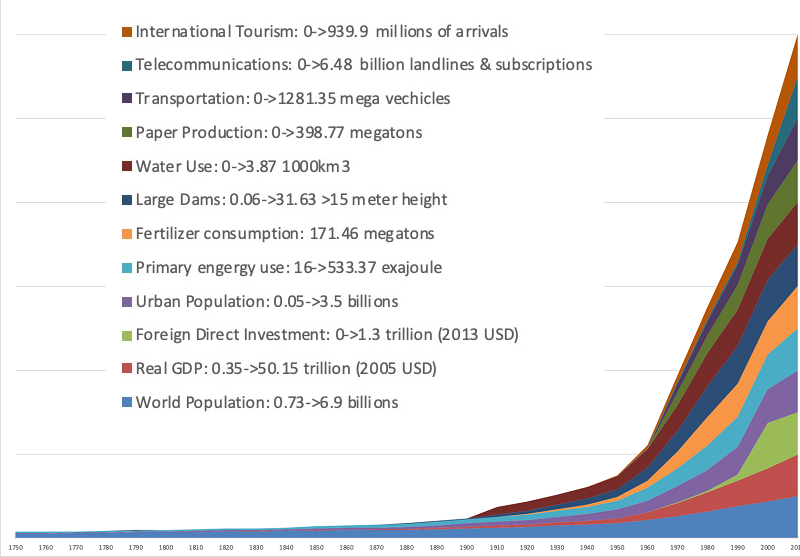
|
Mother Pelican
A Journal of Solidarity and Sustainability
Vol. 18, No. 8, August 2022
Luis T. Gutiérrez, Editor
|
|
|
|

|
|
|
The Great Acceleration and Time Under Capitalism
Victor M. Toledo
This article was originally published by
Voices for Mother Earth, 28 June 2022
REPUBLISHED WITH PEMISSION

Socioeconomic Trends of the Great Acceleration of the Anthropocene from 1750 to 2010. The data graphically displayed is scaled for each subcategory's 2010 value. Source data is from the International Geosphere-Biosphere Programme (www.igbp.net).
Image credit: Great Acceleration, Wikipedia.
Click the image to enlarge.
See also Earth System Trends 1750-2010.
|
|
The dangers facing humanity, and life on Earth in general, are so vast, complex and unpredictable that they are difficult to understand. One of the most important has to do with time.
Various thinkers have brilliantly contributed to revealing the perils of time in contemporary society. Thanks to their contributions, today we can connect the global phenomenon of the sudden acceleration of everything that exists with the behavioral consequences of this phenomenon, that is, with the impacts on the behavior of individuals and on institutions. These consummate connections revolve around time in the modern world.
We are indebted to U.S. historian J.R. McNeill for the environmental history of the twentieth century. In his magnificent work Something New Under the Sun (New York, Norton: 2000), he revealed in great detail what happened between the years 1900 and 2000 and its major effects on the equilibrium of the planet. A second book, written with P. Engelke ( The Great Acceleration, Cambridge, MA: Harvard University Press, 2016) revealed with great finesse an unprecedented process of general acceleration: “Earth has entered a new era — the Anthropocene — in which human beings have become the most powerful force on the global ecosystem.” Since the middle of the 20th century, “the accelerating rate of energy use, greenhouse gas emissions, and population growth have led the planet into an experiment without control.” And they add: “… the period from 1945 to the present represents the most anomalous period in all of history. Three quarters of the carbon dioxide that has been injected into the atmosphere has accumulated since the end of World War II, and the number of humans on the planet has tripled (from 2.3 billion to 7.2 billion between 1945 and 2015).” In these seven decades there has been an explosion in the use of oil and other fossil fuels, in addition to other factors resulting from such technological innovations as the production of artificial fertilizers, the appearance of containers for the transport of goods and the proliferation of plastics. All of the above was demonstrated by the 24-factor curves. Everything suddenly accelerated after 1950 in surprising synchronicity: human population, city dwellers, number of cars, cell phones, world gross domestic product, energy use, greenhouse gases, water use, dams, deforestation, paper consumption, tourism, McDonalds, etc. https://www.scinapse.io/papers/2139274755. But the global acceleration that has taken place in the world of things is also expressed in the concrete dimension of the world of beings, and it also has an origin. It obeys the principle of the insatiable desire for profit, that is, it is a direct consequence of the needs of capital, as the Mexican philosopher and historian Luciano Concheiro has brilliantly demonstrated in his book “Contra el tiempo” | Against Time (2016). The guiding mechanism that capital imposes is contained in the formula by which money becomes first a commodity, then transforms back into money (M-M-M). However, the money obtained at the end is always greater than the initial money. This surplus is what is known as surplus value. “The history of capitalism — says Concheiro — can be read as a permanent succession of technical and technological innovations, all of them aimed at accelerating production or circulation times.” In other words, the more the capital turnover time is shortened, the greater the profit. Speed then appears as an ally of the infinite accumulation of wealth. In the industrial age, time itself accelerated as we moved from the steam engine to the internal combustion engine, to jet engines, and to ion thrusters. Or from the telegraph to the telephone and the Internet. Life became faster as it passed from mercantile to industrial, then on to financial capitalism (or turbo-capitalism). In the latter, profits are achieved in fractions of a second thanks to supercomputers and developed algorithms (see the series Billions, on Netflix).
Concheiro masterfully examines the effects of this process on politics (short-termism), the ephemerality of merchandise (planned obsolescence), frenetic consumption, relationships, bodies, and psychic health. Under the dictatorship of speed, individuals become stressed and anxious beings and therefore live permanently tired (see The Society of Fatigue by Byung-Chul Han, 2012 | aka in English translation The Burnout Society, 2015).
In short, the speed of modern life strips existence of meaning ( Concheiro), dangerously threatens the equilibrium, or balance, of the planet and, above all, threatens good living, buen vivir. These are the perilous times of capitalism.
Translated by Jane K. Brundage from the article, La Gran Aceleración y el Tiempo del Capital, Victor M. Toledo,
La Jornada, 28 June 2022.
|
ABOUT THE AUTHOR
Victor M. Toledo, research scientist at the Institute for Ecosystem and Sustainability Research (Instituto de Investigaciones en Ecosistemas y Sustentabilidad), Morelia Campus UNAM, is a Mexican biologist with PhD from the National Autonomous University of Mexico (UNAM). Dr. Toledo has combined his scientific training with studies in economic policies, agrarian cultures and rural sociology. An expert in ethnoecology (the cross-cultural study of how people perceive and manipulate their environments), his studies and theoretical contributions regarding the relations between indigenous cultures and the natural world are recognized internationally. Dr. Toledo served as head of the Secretariat of the Environment and Natural Resources (SEMARNAT) in the administration of Mexico President Andrés Manuel López Obrador from May 2019 to September 2020.
|
|Back to Title|
LINK TO THE CURRENT ISSUE
LINK TO THE HOME PAGE
|
|
|
|
"You don't choose your family. They are
God's gift to you, as you are to them."
Desmond Tutu (1931-2021)
|
|
Page 13
|
|
FREE SUBSCRIPTION
|
![[groups_small]](groups_small.gif)
|
Subscribe to the
Mother Pelican Journal
via the Solidarity-Sustainability Group
Enter your email address:
|
|
|
|